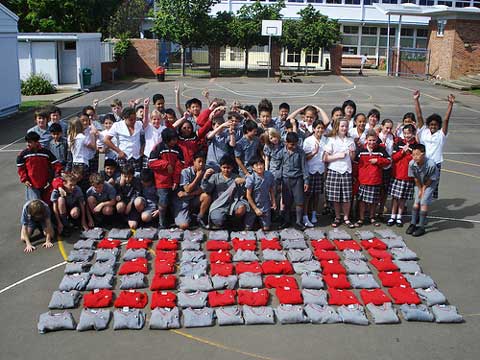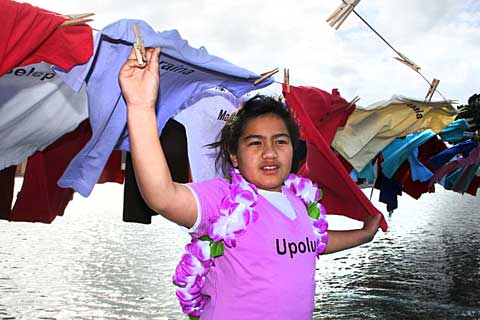 Oxfam NZ’s executive director Barry Coates provides perspective on the final day of negotiations in Copenhagen. With the dust still to settle, his analysis is about as thorough as you’re likely to find. The full set of Barry’s updates are posted at Oxfam’s web site and also at Pacific Scoop.
Oxfam NZ’s executive director Barry Coates provides perspective on the final day of negotiations in Copenhagen. With the dust still to settle, his analysis is about as thorough as you’re likely to find. The full set of Barry’s updates are posted at Oxfam’s web site and also at Pacific Scoop.
Day 12 – Friday 18th December
Historic opportunity, historic moment, historic CoP out
This saga is unfolding as I write. A few hours ago we thought the deal was done and put out an (almost) final press release. Then the apparent agreement between President Obama, Wen Jiabao, the EU, India, South Africa and a few other big countries started to unravel.
First the EU said they were unhappy about it (which may just have been spin doctoring to cover their embarrassment over a massively weak deal), then Sudan (chair of G77 – the group of developing countries) said they had not been consulted and would not accept the deal, and then AOSIS – the group of small island states – said they would be submitting a new draft agreement. As it has been for most of the past two weeks, the process is in chaos.
The day started as it has ended, with confusion about what was actually happening behind the scenes. The heads of state had met late into the night and we were leaked the draft statement at 2.30am. It was no surprise that leaders had not come with ambitious proposals but the obvious depth of disagreement was a surprise. The result was a very weak proposal that did not even fully agree the goal to maintain global temperature rise at below 2°C.
The much vaunted announcement of US$100 billion for long term funding turns out to be a goal to mobilise funds, not a commitment; to come from carbon markets, not just public financing; potentially a mix of new funds and diversion of existing aid; and without any specifics on the sources of funding. Oxfam has been calling for predictable funding that is raised directly (such as through a levy on airline and maritime fuels), rather than through national Treasuries (which could add to government budgets).
So this deal that is spun in the media as “an agreement to move forward’ is probably not an agreement, not much movement and it is doubtful that it is even forward.
I seem to have been doing this analysis of drafts for a very long time. There have been six versions and lots of discussions on each one. It is the last night of negotiations and I still haven’t made it to bed before 1am.
I was in the hotel for almost the whole day today, writing and analysing. But I have had a few breaks. One for meeting up with an old friend from Vietnam who works for the UN and one for an interview with TVNZ. The media have been very interested in the messaging from here – it has been great to be able to tell the real story from Copenhagen rather than the version according to the NZ government.
This won’t be the last blog. I am going to bail out tonight and catch up with the final statements in the morning. It’s a final wrap up day tomorrow, but with these negotiations you never know! This may appear to be a pretty disappointing outcome but it should really motivate us to re-double our efforts to get the Ministers back into the process.
Here are the details of what happened and where to from here:
Oxfam analysis of the Copenhagen climate change convention
The empty political statement issued from Copenhagen shows a historic lack of leadership. The key political decisions were not taken at the start of these negotiations and they have still not been taken. This job has not been done.
As a result, the blame game has started. Oxfam considers that the primary cause of failure lies with the rich nations – they have failed to come with proposals that would fulfil their responsibilities, while trying to shift the burden onto developing countries. It is welcome that the US, as one of the biggest polluters, has rejoined the multilateral system. But their proposals must strengthen, not undermine, the commitments from rich countries, which fall far short of averting climate catastrophe.
Poor countries negotiated strongly for a deal that is consistent with the science, and which aimed to protect vulnerable people and planet. The shame of Copenhagen was that rich countries have negotiated primarily on behalf of vested interests and industrial lobbies.
At best, we are now confronted with deadly delay that means unnecessary tragedy for millions of families. The impacts will be felt in every country, and will fall particularly hard on poor people in developing countries.
Just as alarming is that there is no clear and credible way forward to conclude a legally binding agreement soon. Leaders ducked the political decisions that have been lacking since the launch of negotiations two years ago in Bali. There is still no agreement to the fundamentals. This is unacceptable.
Analysis of the outcomes
The negotiations started with ten days of meetings between officials and then the high level segment of three days involving Ministers and Heads of State. The talks got off to a bad start with the leak of a secret draft of an outcome statement that the Danish government, as President of the Conference, was preparing. A selected group of countries was consulted in the drafting process, and the draft was seen to be biased towards the interests of the rich nations. When the Danish Prime Minister subsequently tried to introduce a draft text as a basis for negotiations, developing countries angrily rejected it.
Negotiations continued in the two tracks that were agreed in Bali two years ago – a second commitment period under the Kyoto Protocol (KP) and a new Long Term Agreement (LCA). In Copenhagen, negotiators reduced the size of the document, but did little to agree the hundreds of unresolved issues.
There was also clumsy management of the talks over the attempt to combine the two negotiating tracks, strongly resisted by developing countries who saw it as part of an effort by rich nations to evade their commitments to emissions reductions under the Kyoto Protocol. The talks teetered on the brink of collapse several times, wasting valuable negotiating time.
Then the Climate Change Ministers and 115 Heads of State arrived. The particular role for the high level segment was to come to agreement on the big political decisions that have been blocking negotiations. They failed to do so, primarily because rich countries, having promised to play their trump cards at the eleventh hour, turned up almost empty handed.
Global goal: Leaders could not even agree on a goal to keep global temperature increase well below 2°C – they only referred to the goal and undertook to enhance their action. So far, Annex 1 emissions cuts tabled in negotiations add up to only 13-19% below 1990 by 2020. When adjustments are made for the effect of loopholes on AAU surpluses (hot air), LULUCF accounting and bunker fuels, Annex 1 emissions would actually rise. This puts is on track for global temperature rise of well above 2°C and catastrophic climate change – modelling suggests by as much as 3.9°C.
Finance: The announcement of $100 billion for adaptation and mitigation by 2020 is an important step forward – finally specific amounts of funding are being discussed. But there is no clarity on how much will be public finance – reliable and predictable funds that will allow poor countries to plan and invest in adaptation and low carbon development. It seems that rich countries are keen to inflate the total with private finance through market mechanisms. Furthermore, there is no clear commitment that this money would not come from existing aid commitments, effectively diverting future spending away from essential services in poor countries. Finally there is no clarity on the individual commitments rich countries will make. This potentially continues a long line of empty promises by world leaders.
Legally Binding: The commitment to complete the deal is a hollow promise without a clear plan for what a legally binding treaty or treaties will look like, whether all rich nations will be legally bound to reduce their emissions, and how we will get there – and no new commitment period established under Kyoto.
Next steps:
Business-as-usual negotiations are failing to solve the climate crisis. Options on the table are too vague for decision-making, and do not reflect evolving climate science. Technical negotiators are debating issues that need ministerial mandate but too little time is given for ministers’ talks to make progress leading to last-minute late-night decisions. Governments are still focused on securing national interest instead of securing our shared destiny.
The international process must now gear up to a new level of talks. Sustained, intense and focussed engagement must run throughout the year – at the political, scientific, technical and public levels. The key to unlock these issues is political agreement on fundamental milestones. To move forward, negotiators must first agree a global goal, a scientifically credible range for mid-term emissions reductions, and a framework for funding.
1. Heads of State: demonstrate climate leadership – The last two years of competitive negotiations must now be turned into collaborative engagement for a deal in 2010, starting with a new mandate driven by Heads of State.
2. Ministers: prepare for Sleeping-Bag Ministerials – A set of intense quarterly meetings for both tracks of negotiations must drive to political agreement. Each ministerial should end only when its mandated milestone is reached: for example, to halve the number of brackets in the text, and halve the size of the numeric ranges set out in the remaining brackets.
3. Climate scientists: put facts back at the heart of negotiations – Climate science is evolving rapidly and alarmingly, but negotiations continue on the basis of outdated projections. Updated estimates on emissions trajectories from the IPCC are urgently needed, including a scenario for limiting global temperature rise to 1.5ºC.
4. Negotiators: provide analytical support for decisions – Vague definitions and unclear options in the text are holding up negotiations. Technical experts must clarify definitions and rules (such as on LULUCF accounting) to close loopholes, and detail options on burden sharing criteria and innovative finance mechanisms. LDCs should have access to technical support from a standing team in the UNFCCC. Civil society could contribute to the integrity of the negotiations by providing them with a formal role in submitting proposals.
5. Public support: build the case and widen the base – Over the past two years there has been a massive increase in public understanding of climate change and commitment to action. From the boardrooms of progressive businesses to communities across the developing world there is now a global demand for leaders to conclude a fair, ambitious and legally binding deal. Copenhagen may have been a cop out but Oxfam will continue to work with our partners and allies across the world in an attempt to avert climate catastrophe.

 Oxfam’s messages on the battering effects of climate change on poorer countries continue with the publication this week of their report
Oxfam’s messages on the battering effects of climate change on poorer countries continue with the publication this week of their report 
